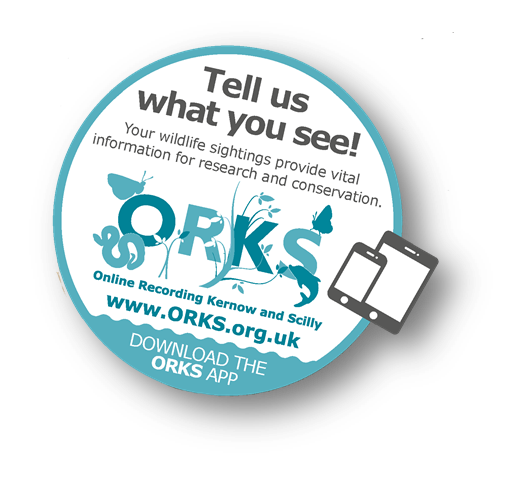
Anyone can be a recorder - if you are out and about and you see anything, tell us what you see!
From mosses, lichen, fungi and plants to birds, mammals and invertebrates, ERCCIS is keen to hear about any wildlife you’ve seen, whether in your garden, on the coast or in the countryside.
Why record wildlife?
All wildlife records are important as they help us to understand and conserve the natural history of Cornwall and the Isles of Scilly. Information about the wildlife that exists in an area can guide conservation management, influence planning decisions, help measure the condition of the environment and monitor changes over time. Recording is also a great way to explore our rich and diverse terrestrial, freshwater and marine environments and learn more about the wildlife you encounter along the way.
It's key to make sure the information you collect are put to work for the better conservation of Cornwall's natural environment, the best way is to share your sightings with your Local Records Centre. Here your record is processed following national standards and made available to other recorders, researchers and both local and national decision makers. Make your sightings have an impact and share with ERCCIS.
What is a wildlife record?
A wildlife record is an observation made by a person at a given location and on a particular date. The species can be common, unusual or rare and you don't need to have seen the creature itself; perhaps you’ve identified mammal droppings or a bird song.
How do I record wildlife?
Anyone who is interested in wildlife and the environment can become a biological recorder, no matter what your age, skills or experience. You simply need to provide details of WHAT you saw, WHERE you saw it, WHEN you saw it and WHO you are. ERCCIS has lots of resources to help with identification and you can also contact the Wildlife Information Service with a description and good quality photograph if possible. In addition, specimens are useful to confirm identification which can be sent to ERCCIS or the relevant County Recorder for verification
Please be a careful and considerate recorder by following the Country Side Code. Be aware of your impact in the environment and ensure your health and safety at all times.
Share your records
Sharing your records with your Local Environmental Records Centre or national recording scheme is the most important part of biological recording. This ensures your data is available for the better conservation, sustainable development and research.
You don’t even need to have seen the organism itself; perhaps you’ve identified mammal tracks or a bird song. Just remember to make a note of anything you think may be relevant or interesting - and of course make sure to submit a record to ERCCIS as your Local Records Centre for safe storage. We never pass on personal details without permission but we like to get in touch to offer feedback, such as for records of notable or interesting species in the information that you submit, or to offer recorder support.
Download the ERCCIS Wildlife Recording Form
Ways to share your records
- Simply fill in the recording form and send it to us by post.
- Go online and add your records through our online recording website - https://erccis.org.uk/share-sightings
- Use the ORKs App while you are out and about.


